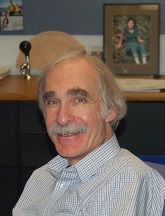
Martin Lawrence Privalsky
Distinguished Professor of Microbiology and Molecular Genetics
Throughout life Marty Privalsky was deeply drawn to understand how things worked. As a scientist he made key discoveries concerning the action of viral oncogenes and distribution of nuclear hormone receptors in normal and abnormal human cells, with particular attention to their roles in disease states. Brilliant and with broad interests, Marty nonetheless was a gentle soul with an understated demeanor, remarkable generosity toward students and colleagues, and a playful sense of humor that aimed to illuminate, not ridicule.
Marty’s life and scientific career were shaped by the love and support of his family, by the public school system of the City of New York, and by the great public research universities of New York and California. Marty’s parents stressed education as fundamental to a rewarding life, and this resonant message initiated his journey of learning and discovery.
In childhood the expanding vistas of science fascinated Marty, who carried out experiments in chemistry, electricity, and photography in the basement of his modest Brooklyn apartment. Mostly, his family considered him interesting but unexceptional. That view changed when Marty placed third in the city on the highly competitive New York State Regents scholarship exam for high school seniors. From the New York Times list of the top 20 students, 19 reportedly attended schools for the gifted; Marty was the lone representative from a neighborhood high school. This scholarship allowed Marty to attend SUNY Stonybrook, where he discovered the possibilities of a research career while earning his bachelor’s degree in biochemistry, summa cum laude.
For graduate education Marty went west to UC Berkeley, completing his Ph.D. in 1979 under the mentorship of Ed Penhoet, a leading molecular biology pioneer who founded one of the first biotech companies in California. At Berkeley Marty recognized the potential of viruses as an experimental system, launching a four-decade exploration how viral genes, their cellular homologs, and mutant nuclear receptors give rise to cancer and other diseases. Marty published his graduate work in three impactful papers, with his mentor as the only co-author.
This success catapulted Marty to a five-year postdoctoral fellowship at UC San Francisco with J. Michael Bishop, who with Harold Varmus would later share the 1989 Nobel Prize in Physiology or Medicine for discovering the cellular origin of viral oncogenes. Marty authored seven papers describing oncogenes that enable neoplastic transformation by the avian erythroblastosis retrovirus. Notably, he retained a life-long connection with UCSF, subsequently spending two sabbaticals there.
In 1984 Marty began his UC Davis career as an Assistant Professor. Trained in molecular biology and virology, his hiring into the Department of Bacteriology (now Microbiology and Molecular Genetics) reflected a purposeful expansion of the departmental research portfolio, acknowledged in its later name change. Marty similarly broadened departmental teaching, offering a graduate-level course entitled Recombinant DNA Techniques. From the outset this was extremely popular because such research approaches were thinly represented in campus laboratories in that era. Marty’s dedication to continuously updating this course was legendary.
All Marty’s formal undergraduate and graduate teaching benefited from his broad knowledge of cell biology, and late in his career Marty designed a new and very well-received class in cancer biology, thoughtfully mentoring his younger co-instructors to ensure this course became an evolving fixture in the curriculum. In 2000 Marty received the Graduate Teaching Award of the Biochemistry and Molecular Biology Graduate Group, reflecting student appreciation of his scholarly contributions.
By any measure, the basic research program Marty established was exceptional in scope, scientific impact, and dedication to training the next generation of scientists. In 2012 he was named Distinguished Professor of Microbiology and Molecular Genetics, capping a remarkable career. Although Marty’s earlier graduate and postdoctoral productivity demonstrated he was a superb bench scientist, it was both unusual and noteworthy that during his entire professorship Marty continued to carve out time at the bench, conducting experiments for his research publications. He was good at benchwork, and he enjoyed it. Marty was equally adept at managing a dynamic research laboratory. He and his lab colleagues made seminal discoveries, driven by Marty’s intellectual curiosity and untiring creativity. Two exceptional 10-year MERIT awards from the National Institutes of Health are one indicator that Marty was at the top of his field. He left a legacy of 118 influential publications and – of enormous importance to him – trained more than 35 graduate students and postdoctoral scholars for whom he was an exemplary mentor.
Marty additionally devoted much energy in service to the campus and his scientific field. He left a lasting imprint on graduate education at Davis, administering the NIH Training Program in Molecular and Cellular Biology and serving in leadership roles for the Biochemistry and Molecular Biology, Microbiology, and Genetics Graduate Groups. Nationally, Marty was a sought-after reviewer for manuscripts and research grants, serving on editorial boards of leading scientific journals and on multiple NIH study sections.
In 2012 Marty was diagnosed with multiple myeloma, which he faced with pragmatism and grace. He received outstanding medical care from UCSF and Sutter Sacramento which, together with strong support from his wife Sue, afforded eight more years of life as he carried on research and teaching. Marty spent the last two months at home, completing two publications in his final weeks. One was a beautiful volume of his photos, entitled Reflections from the common theme of naturally mirrored images; its creation also enabled Marty to look back on his rich and satisfying life. The other was his last scientific paper, entitled “Specific ablation of the NCoR co-repressor δ variant reveals alternative RNA splicing as a key regulator of hepatic metabolism,” published in PLoS One two days before his passing.
Marty was the epitome of a University of California faculty member: a superb scientist, gifted teacher and mentor, and strong advocate for shared university governance. His contributions to the department, college and campus were profound, made with kindness, humor, and humanity.
Wolf-Dietrich Heyer
Douglas Nelson
Chester Price
